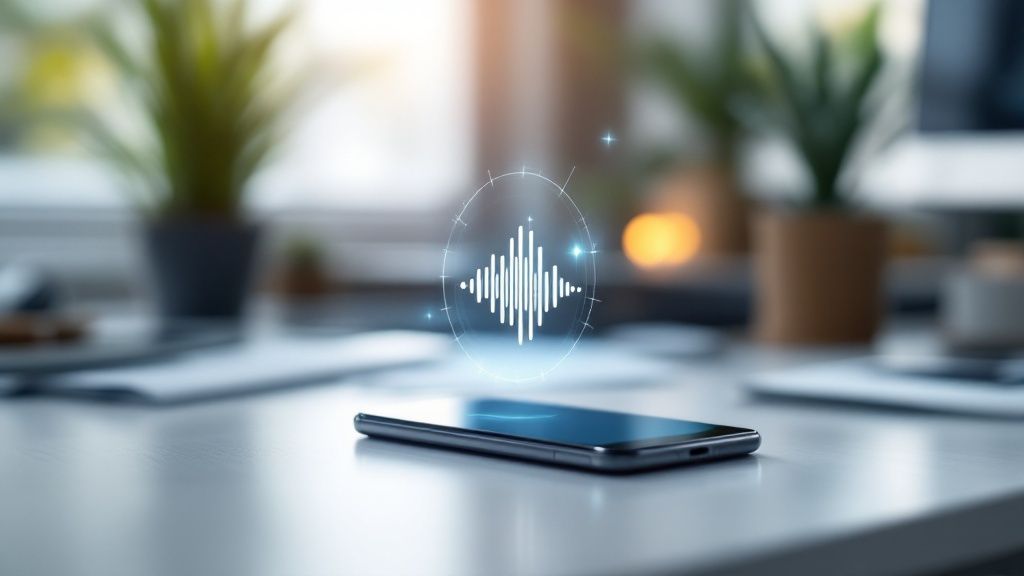Think of an AI phone answering service as a smart, automated system that works like a digital receptionist for your business. It's designed to handle calls 24/7, fielding questions, booking appointments, and directing callers, all without needing a human to step in. This means you never have to worry about missing an important call again.
Beyond Voicemail: The Modern Digital Receptionist
This isn't your parents' "press one for sales" system. Forget those old, frustrating robotic menus. A modern AI phone answering service is a massive leap forward. It’s less like a machine and more like an incredibly efficient team member who is always on, ready to manage your inbound calls with smarts and precision.
At its heart, this technology is built to do one thing exceptionally well: figure out what a caller needs and then take the right action, instantly. This is all possible thanks to some pretty sophisticated tech working behind the scenes.
How AI Understands and Responds
The real magic behind an AI answering service is how it processes human language. This isn't just about recognizing a few keywords; it's about genuine understanding, which comes down to two key pieces of technology:
- Natural Language Processing (NLP): This is what lets the AI listen to and actually comprehend what someone is saying. NLP helps the AI pick up on intent, context, and even the caller's mood, much like a person would during a conversation.
- Machine Learning (ML): This is the part that allows the system to get smarter over time. With every call it handles, the AI learns from the interaction, refining its answers and improving its accuracy. It essentially adapts to the unique needs of your business and your callers.
This powerful combination allows the AI to do much more than just take a message. It can handle complex questions, pull detailed information from your company's knowledge base, and create a conversational experience that feels natural and helpful, not cold and robotic.
An AI phone agent doesn't just record messages; it engages with callers, solves problems, and actively moves business forward, even when your office is closed. It’s a proactive tool for customer engagement, not just a passive message taker.
The Growing Shift to AI in Customer Service
The move toward AI-powered communication is happening everywhere. Businesses are quickly bringing these systems on board because they see a huge impact on both efficiency and customer happiness. For instance, organizations using generative AI for customer service have seen a 14% increase in issues resolved per hour and a 9% reduction in call handling time.
By 2025, it's expected that 80% of companies will use AI chatbots to support their customer service operations. This shows just how mainstream this technology has become across all industries.
This rapid adoption is all thanks to the real, measurable benefits these systems deliver. For a closer look at what’s possible, providers like cxconnect.ai's AI phone answering solutions show how these technologies are being packaged for businesses today.
Traditional Phone Systems vs AI Phone Answering Services
To really understand the upgrade, it helps to see a direct comparison. Here's a look at how a modern AI system stacks up against the old way of doing things.
| Feature | Traditional Answering Service | AI Phone Answering Service |
|---|---|---|
| Availability | Limited to human operator shifts | 24/7/365, never takes a break |
| Cost | High per-call or per-minute fees | Lower, predictable subscription cost |
| Scalability | Limited by number of human agents | Instantly scales to handle any call volume |
| Consistency | Varies by agent and time of day | Delivers a consistent, branded experience every time |
| Data & Analytics | Basic call logs, often manual | Detailed analytics, sentiment analysis, and call transcripts |
| Appointment Scheduling | Manual, prone to human error | Automated and integrated directly with calendars |
| Learning Ability | Relies on human training | Continuously learns and improves from every interaction |
Ultimately, an AI phone answering service creates a smarter, more responsive front door for your business—one that is always open, always helpful, and always working to build better relationships with your customers. It’s the modern answer to an age-old challenge: being there whenever your customers need you.
What Are the Real-World Benefits of an AI Answering Service?

Let's move past the technical details and talk about what an AI phone answering service actually does for your medical practice. The impact isn't just theoretical; it's something you'll feel right away in how you connect with patients and manage your day-to-day work.
These systems do more than just pick up the phone. They create opportunities, make patients happier, and give your team the breathing room they need to focus on what matters most.
You're Genuinely Available 24/7
Your practice might close at 5 p.m., but patient needs don't follow a schedule. An AI answering service keeps your phone lines open around the clock—whether it's midnight, a weekend, or a holiday.
This constant presence means you never miss a call from a new patient looking to book an appointment or an existing patient with an urgent question. When someone calls after hours, they're often ready to act. If they hit your voicemail, there's a good chance they'll just call the next practice on their list.
With an AI agent, every call gets a prompt, professional answer, ensuring every single opportunity is captured. Being there when patients need you is a powerful way to build trust and loyalty.
You'll See Significant Cost Savings
Hiring a full-time receptionist—or several, for 24/7 coverage—is expensive. You’re looking at salaries, benefits, training, and overhead. Those costs add up fast.
An AI phone answering service flips that model on its head, usually with a predictable monthly fee. This gets rid of the high, variable costs of staffing while giving you far more capacity to handle calls.
By automating the routine parts of call handling, an AI service can push the cost of each individual call down to almost zero. This means a direct, often dramatic, reduction in your operating expenses and a much healthier bottom line.
It’s like having an entire team of receptionists for less than the cost of one. That's money you can put back into things that directly improve patient care or grow your practice.
You Can Drastically Improve the Patient Experience
Nothing frustrates a caller more than long hold times or getting inconsistent information. Many people will simply hang up rather than wait in a queue, which means a lost opportunity and a mark against your reputation. An AI service answers every single call instantly.
On top of that, the quality is always the same. Every caller gets the same polite, accurate, and professional interaction, every single time.
An AI assistant can also make the experience feel more personal by:
- Greeting returning patients by name.
- Pulling up their history for better context.
- Answering common questions on the spot, without a transfer.
This kind of instant, reliable service makes patients feel seen and valued, which is absolutely essential for keeping them with your practice long-term.
Your Team Can Finally Focus
Your skilled staff shouldn't be spending their days answering the same basic questions over and over. Every minute they’re tied up with simple administrative tasks is a minute they aren't focused on more complex patient needs or other high-value work.
An AI phone answering service acts as a smart filter. It handles all the routine inquiries, like confirming office hours, giving directions, or booking standard appointments.
This frees up your team to concentrate on the work that truly requires a human touch—from handling complex insurance questions to providing compassionate patient support. By taking the repetitive tasks off their plate, you boost productivity, improve morale, and reduce the risk of burnout.
Must-Have Features in an AI Phone Service

When you start looking at different AI phone answering services, it’s easy to get lost in a sea of technical jargon. But not all of them are built the same. The real difference between a basic call-bot and a genuinely useful tool comes down to a few critical features.
Think of these as the non-negotiables. They’re what elevate an AI from a simple answering machine to a core part of your practice’s operations. Let's dig into what you should absolutely be looking for.
Intelligent Call Routing and Intent Analysis
A great AI service doesn't just pick up the phone; it actually listens. Using natural language processing, it can figure out why someone is calling. Is it a new patient trying to book their first visit? An existing patient with a billing question? Or someone just looking for your office hours?
Once the AI understands the caller's intent, it can intelligently route the call to the right place. That might be a specific department, a live staff member, or a self-service option for simple requests. This simple step saves your team from constantly playing traffic cop with phone calls and gets patients the help they need, fast.
Automated Appointment Scheduling
For any medical office, the appointment book is the heart of the operation. That’s why automated appointment scheduling that connects directly to your EMR or practice management software is an absolute game-changer.
Imagine a patient calls to book an appointment. Instead of your staff putting them on hold to check schedules, the AI can:
- Ask what kind of appointment they need.
- Instantly see real-time availability for the right doctor or provider.
- Offer a few open time slots and let the patient pick one.
- Book the appointment directly into the calendar and send confirmations automatically.
This one feature frees up an incredible amount of staff time, slashes the risk of scheduling mix-ups, and lets patients book an appointment whenever it's convenient for them—even at 2 a.m. To pull this off, the system needs to use real-time speech to text technology to understand what the caller is saying and respond without any awkward delays.
Deep CRM and EMR Integration
An AI phone system working all by itself is like having one hand tied behind your back. Its real power is unlocked through deep integration with your CRM or EMR system.
This is what allows the AI to have truly personal and helpful conversations. When a patient calls, an integrated AI can instantly pull up their file. It can greet them by name, see their appointment history, and provide answers that are specific to them. It’s this seamless flow of information that makes the experience feel less like talking to a machine and more like talking to someone who knows them.
A truly smart AI doesn't just answer the phone; it knows who is calling. By connecting with your core systems, it transforms a generic call into a personalized, data-driven conversation that makes patients feel understood and valued.
Essential Security and Compliance
In healthcare, data security isn’t just a nice-to-have; it's a legal and ethical requirement. Any AI service you consider must be HIPAA-compliant to protect sensitive patient health information. This means everything from end-to-end encryption to secure data centers and tight access controls. To get a better handle on this, you can dig into our guide on HIPAA compliance for AI voice agents.
Beyond the regulations, you need to trust that the system has strong security measures in place to prevent data breaches. That trust is the foundation of your relationship with your patients.
The market for this technology is exploding for a reason. Valued at USD 2.3 billion, the global call center AI market is expected to reach USD 12.8 billion by 2033, with a stunning 21.31% CAGR. This growth is all about the demand for the kind of smart, efficient, and personalized service these core features make possible.
Your Step-by-Step Implementation Guide

Turning your clinic's phone system from a constant headache into a genuine asset starts with a smart plan. You don't just "turn on" an AI phone answering service; you carefully weave it into the fabric of your practice. Let's walk through the steps to get this right.
Think of it like hiring a new front desk coordinator. You wouldn't just throw them in the deep end without understanding their role. The same goes for your AI—it all starts with a hard look at your own operations.
First, Assess Your Clinic's Real Needs
Before you even start looking at vendors, you need to look inward. What are the specific problems you’re actually trying to solve? Nailing this down from the start will shape every decision you make.
Get your team together and dig into your call patterns. Ask yourselves:
- What's our biggest phone frustration? Is it the flood of missed calls after hours? The sheer volume of routine appointment requests? Or is it staff getting bogged down with endless prescription refill questions?
- What's the ultimate goal here? Are we trying to capture more new patients, free up our staff from repetitive tasks, or just give our patients a better, smoother experience?
- Which tasks are eating up the most time? Identify those simple, repeatable conversations that an AI could handle in its sleep.
Answering these questions gives you a solid checklist of "must-have" features versus "nice-to-haves." This simple step keeps you from paying for bells and whistles you'll never use. For any medical office, this is critical, especially when looking at specialized tools like a virtual medical receptionist built for clinical environments.
Next, Choose the Right Service Provider
Armed with a clear picture of your needs, you can start vetting potential partners. Be critical here—not all AI services are built the same. You'll want to compare them on the features that actually matter to your practice.
Always prioritize providers who specialize in healthcare. They'll understand non-negotiables like HIPAA compliance from day one. Also, think about the future. Can the service scale as your practice grows? And check out their pricing. A straightforward subscription fee is usually much easier to budget for than complex per-call or per-minute rates that can spiral unexpectedly.
The best AI provider isn't just a vendor; they're an integration partner. Look for one that offers solid support, an easy setup process, and has a proven track record helping other medical practices.
Then, Configure and "Train" Your AI Agent
Once you've picked your provider, it's time to customize your AI. This is where you give it your practice's personality and teach it your specific workflows.
Typically, you’ll be setting up a few key things:
- Custom Greetings: Record warm, professional greetings that sound like your practice.
- Call Flows: Map out the conversation paths. For example, if a caller says, "I need to make an appointment," the AI needs to know exactly what to ask next.
- Knowledge Base: This is the "training" part. You'll feed the AI answers to all the common questions about your office hours, location, insurance policies, and services.
Getting this initial setup right ensures the AI operates as a seamless extension of your team, delivering accurate and helpful information every time.
Finally, Integrate With Your Existing Systems
For an AI answering service to truly make a difference, it can't operate in a silo. It needs to talk to the software you rely on every single day. For any medical practice, the most crucial link is with your Electronic Medical Record (EMR) or Practice Management (PM) system.
This connection is what turns the AI into a real powerhouse. It allows the AI to book appointments directly into your schedule, reference patient files for context, and log call details automatically. No more manual data entry. This is what moves it from being a glorified answering machine to a smart administrative partner.
Before you go live, test everything. Have your team call in and pretend to be patients with all sorts of requests—the easy ones and the tricky ones. This lets you find and fix any awkward phrasing or broken call paths, guaranteeing a smooth and professional experience for your patients from their very first call.
Calculating the ROI of an AI Answering Service

When you're thinking about bringing an AI phone answering service into your practice, it’s more than just a tech upgrade—it's a financial decision. The key is to look at the return on investment (ROI) from all angles. It's not just about swapping one cost for another; it’s about uncovering direct savings and, more importantly, finding new revenue the technology unlocks.
The most obvious win is in direct cost reduction. Think about your current front-desk expenses: salaries, benefits, training, the works. An AI service can handle a huge chunk of those routine calls for a fraction of the cost, giving your overhead an immediate haircut.
But honestly, the biggest value isn't always what you see on a spreadsheet at first glance. It's the less obvious gains that really fuel growth and keep patients coming back.
Quantifying the Tangible Savings
First things first, let's look at the hard numbers you already have. Tallying up the direct savings is a straightforward exercise that puts the whole ROI conversation into perspective.
Here’s what to add up:
- Reduced Staffing Costs: Pit the monthly cost of an AI service against the fully-loaded expense of a human receptionist—that means salary, insurance, and paid time off.
- Lower Training Expenses: Your AI doesn't need onboarding or training refreshers for common questions. Those costs just disappear.
- Eliminated After-Hours Coverage Fees: If you're paying a premium for a traditional answering service after 5 PM or on weekends, a 24/7 AI solution offers better coverage for a predictable, flat fee.
Often, these direct savings alone are enough to show that the AI pays for itself from day one. This simple math gives you a solid foundation before we even get to the more exciting part of the ROI calculation.
Measuring the Value of Captured Opportunities
Here’s the million-dollar question: what's a missed call really worth? This is where an AI phone answering service truly proves its value. Every single call that gets answered after hours—instead of being dumped into voicemail—is a potential new patient or an existing one you’ve just kept happy.
The most powerful financial impact of an AI answering service isn't just in the money it saves, but in the new revenue it actively generates. By being available 24/7, it transforms missed calls from lost opportunities into captured leads and scheduled appointments.
To put a real number on this, start tracking how many appointments the AI books for you outside of standard business hours. Now, multiply that number by your average revenue per patient visit. All of a sudden, a missed call isn’t just a minor annoyance; it's a quantifiable financial loss that the AI is actively preventing. This is a critical piece of the puzzle when calculating the ROI of AI voice agents in healthcare.
Factoring in Long-Term Financial Impact
Finally, don't forget the long game: patient satisfaction and retention. When patients have a smooth, efficient way to get what they need, they're far more likely to stick with your practice and recommend you to others. Better retention means a more stable, predictable revenue stream year after year.
While a bit tougher to measure directly, improved patient loyalty has a clear and significant financial upside. It’s a major reason why this market is booming. The AI for customer service sector, currently valued at USD 13 billion, is on track to explode to nearly USD 84 billion by 2033. That kind of growth is driven by the undeniable economic benefits of automation, cost-cutting, and delivering a consistently great patient experience.
Got Questions? We've Got Answers
Adopting any new tool in your practice is a big decision, and it's smart to have questions. An AI phone answering service can feel like a major change, so let's walk through some of the most common things we hear from practices just like yours.
We want you to feel confident that this isn't just another piece of tech—it's a secure, effective, and practical solution that will make life easier for both your team and your patients.
How Does the AI Handle Complex or Upset Callers?
This is probably the most important question we get. A well-trained AI isn't designed to be a therapist; its job is to be a smart filter. It’s trained to pick up on keywords and tones that signal frustration, confusion, or distress.
When the AI detects a caller is upset, it doesn't try to solve the problem itself. Its programming immediately kicks in to de-escalate and transfer. It will say something natural like, "I understand this is a specific concern. Let me connect you with someone on our team who can help you right away." The call is then seamlessly routed to a live staff member, ensuring a human touch is always there for sensitive situations.
Is My Practice and Patient Data Secure?
Absolutely. Security isn't just a feature; it's the foundation for any AI service built for healthcare. Any reputable provider will be HIPAA-compliant from the very first line of code.
This involves multiple layers of security:
- End-to-End Encryption: Your call data is scrambled and protected, whether it's moving across the internet or sitting on a server.
- Secure Infrastructure: The entire system lives in highly secure, access-controlled data centers.
- Strict Access Controls: Only authorized people can access sensitive patient information, and every action is logged.
This is why choosing a provider that lives and breathes healthcare is so important. They get the immense responsibility of protecting Patient Health Information (PHI) and have the safeguards built right into their platform.
What Does the Setup Process Actually Look Like?
Getting started is usually much simpler than you might imagine. You don't need a team of IT experts on your end. The process is a partnership.
First, you'll map out your most common call scenarios with the provider—what happens when someone calls to schedule an appointment versus asking about insurance? Then, you provide the core information the AI needs to know, like your office hours, address, and which insurance plans you accept. Finally, the service is connected to your calendar or EMR. Good providers will have a dedicated person to walk you through everything, making sure it all goes off without a hitch.
Ready to see how an AI-powered voice agent can give your practice a serious boost in efficiency and patient satisfaction? Simbie AI offers a clinically-trained, HIPAA-compliant solution that takes care of routine calls 24/7. This frees up your team to focus on what truly matters—caring for patients. Learn how you can cut administrative work by up to 60% and make sure you never miss a patient call again. Explore what Simbie AI can do for you.

